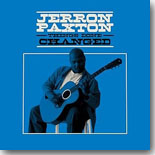|
Jerron Paxton
Revival
House of Berry
Productions
|

I didn’t really know much about
Jerron Paxton until I heard his interview
on the fascinating Last Fair Deal: The Robert
Johnson Podcast a few years ago.
Paxton was born in California in the Watts district of
L.A., but his grandparents had Louisiana roots. As a youngster, he
listened to a blues radio station and to the old Cajun and blues songs
that his grandmother used to sing, and he became interested in those
styles of music, especially after hearing the voice of Bukka White on
the radio.
Paxton began playing music in his early teens, beginning
with the fiddle at age 12 and the banjo at 14. He began to lose his
sight as a teenager, going blind by the age of 16. At 18, he moved to
New York to attend Marist College and began playing gigs around
Brooklyn, focusing on old-time, blues and roots music. He eventually
began to play festivals and shows throughout the U.S. and made a huge
impact with his appearance at the Lead Belly Tribute in 2016 at Carnegie
Hall, leading to even more exposure at festivals and shows. Since his
teens, he has picked up multiple instruments --- banjo, guitar, fiddle,
harmonica, piano, accordion, and the bones.
Paxton’s ability to merge blues, jazz, folk, and country
music, bringing forth traditional music with a modern twist, plus his
humor and storytelling during his performances has earned him even more
attention. Although he’s released several albums over the past decade or
so, his latest release, the amazing Things Done Changed
(Smithsonian Folkways Recordings), is his first album that has received
widespread exposure and attention, and deservedly so.
Paxton wrote all 12 songs and provides personal thoughts
and comments about each tune in the liner notes (there’s also a brief,
but informative bio from Lynell George). The title track opens the disc,
with Paxton on vocals and guitar as he ruminates on an ever-evolving
relationship.
The free-wheeling “Baby Days Blues” finds Paxton
doubling on guitar and harmonica, reflecting on going back to a simpler
time, and “It’s All Over Now” is a song he wrote as a teenager while
learning to play the banjo from his grandfather. His playing on this
track on banjo and bones shows that he learned his lessons well.
“Little Zydeco” is a raucous harmonica instrumental that
serves as a medley of tunes (“Turkey In the Straw,” “The Cottonwood
Reel,” and “The Chicken Reel”) that Paxton associates with Louisiana.
“So Much Weed,” with Paxton on slide guitar, looks at the relaxation of
marijuana laws over the past decade, which didn’t come in time for many,
who suffered legally for possessing and using it years earlier.
The stunning “What’s Gonna Become of Me” was written by
Paxton with his grandmother, and it’s a frenzied blues with lyrics that
reflect the desperation of some of Robert Johnson’s tunes augmented by
banjo playing that sounds a lot like songs I’ve heard that utilized the
African version of the instrument.
“Mississippi Bottom” is a fine traditional Delta blues
that works in the 2020s as well as it would have in the 1920s, while
“Out In This World” is a Piedmont-styled lonesome traveler blues. “All
And All Blues” was written “on the fly,” per Paxton’s liner note
comments, but it’s certainly well-crafted, lyrically and musically, and
the whimsical “Brown Bear Blues” is about his home state but also about
Paxton himself.
He plays piano on “Oxtail Blues,” which serves as a
covert jab at gentrification, and the resulting prices and scarcity of
the soul food delicacy. The desperate “Tombstone Disposition,” which
closes the disc, sounds like a song that Son House could have performed
in the 1930s.
Things Done Changed is a remarkable album that
brings the sounds of pre-war 20th century blues full speed ahead into
the 21st century. Jerron Paxton sounds like he would have been a snug
fit in that era, but thank goodness blues fans have him with us now,
hopefully for many years to come.
--- Graham Clarke